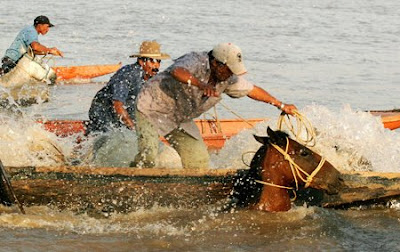Riders of the River: The Annual Apure River Crossing Race
On April 9, 2006, the Apure River in Venezuela became the stage for an exhilarating spectacle that blended history, tradition, and the strength of nature. Over 35 courageous horses, alongside their skilled riders and boatmen, competed in a thrilling river-crossing race, a challenge that harked back to the old customs of river crossings that had once been a vital part of life in the region. This 400-meter (1300 feet) race, which took place on the rugged banks of the Apure River, was not just a competition; it was a vibrant display of Venezuelan heritage and a testament to the deep bond between man, horse, and the land.
The teams, each consisting of a jockey, a boatman, and a horse, had been training for more than two months to prepare for this demanding race. Their goal was not just to cross the river swiftly, but to do so with precision, showcasing the strength, agility, and endurance of both the horses and the riders. The Apure River, known for its powerful currents, provided a challenging and unpredictable course, testing the competitors' skill and unity as they navigated the murky waters.
As the race began, the sight of powerful horses charging through the river, hooves striking the water with force, was nothing short of breathtaking. The horses, many of which had spent years honing their river-crossing abilities, moved with a grace and determination that matched the intensity of the race. The jockeys, perched atop their steeds, steered their horses through the swirling waters, their eyes fixed on the distant riverbank. Meanwhile, the boatmen in their canoes paddled alongside, ready to offer support and guidance as the horses swam across the river.
The roar of the crowd echoed across the riverbanks as spectators cheered on their favorite teams, caught up in the excitement and energy of the event. The tension mounted as the competitors neared the finish line, each team pushing their limits to emerge victorious. It wasn’t just about speed—it was about synchronization and trust between the rider, horse, and boatman, with every movement timed to perfection. The race was a test of endurance, not only for the horses but for the entire team.
At the end of the day, the winners were celebrated with the distribution of over ten million bolívares (around $4,600), a prize that honored the courage and dedication of the competitors. But for many, the real reward was in the pride of carrying forward a tradition that had deep roots in the culture of Venezuela, one that celebrates the strength of the human spirit and the unwavering bond between horse and rider.
As the sun began to set over the Apure River, casting a warm golden glow over the riverbanks, the participants of the race slowly made their way back to the starting point, exhausted but proud. They had once again honored the old ways and shown the world the incredible bond between humans and horses.


